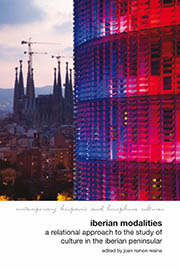Book contents
- Frontmatter
- Contents
- Preface
- List of Contributors
- Introduction: Iberian Modalities: The Logic of an Intercultural Field
- Part I Institutionalizing Iberian Studies: A Change of Paradigm
- Part II Theorizing Iberia
- 5 Iberia Reborn: Portugal through the Lens of Catalan and Galician Nationalism (1850–1950)
- 6 Francisco María Tubino: Between Federalism and Iberianism
- 7 Translation and Conversion as Interconnected “Modes”: A Multidisciplinary Approach to the Study of Ethnicity and Nationalism in Iberian Cultures
- Part III Iberian Dialogs
- Part IV From Sea to Iberian Sea
- Works Cited
- Index
6 - Francisco María Tubino: Between Federalism and Iberianism
from Part II - Theorizing Iberia
- Frontmatter
- Contents
- Preface
- List of Contributors
- Introduction: Iberian Modalities: The Logic of an Intercultural Field
- Part I Institutionalizing Iberian Studies: A Change of Paradigm
- Part II Theorizing Iberia
- 5 Iberia Reborn: Portugal through the Lens of Catalan and Galician Nationalism (1850–1950)
- 6 Francisco María Tubino: Between Federalism and Iberianism
- 7 Translation and Conversion as Interconnected “Modes”: A Multidisciplinary Approach to the Study of Ethnicity and Nationalism in Iberian Cultures
- Part III Iberian Dialogs
- Part IV From Sea to Iberian Sea
- Works Cited
- Index
Summary
When thinking about the topic of this essay, I was puzzled by the astonishing amount of material written concerning the state (Spain) and its relationship with its regional parts: of course I use the term “regional” without any intention of hurting anyone's sensibility. On the contrary, if you want to study the Iberian peninsula on an equal basis (without considering the whole superior or better than its parts and vice versa), then the quantity of material drops dramatically.
Francisco María Tubino, far from being an intellectual or politician involved in some independence project, is an outstanding voice of a special kind of federalism and even Iberianism in nineteenth-century Spain. The aim of this chapter is to examine, sometimes just allusively, two of his many published works, perhaps the most important in connection with the proposal of a new political deal for nineteenth-century Spain, Pátria [sic] y Federalismo (Madrid, 1873) and Historia del renacimiento literario, contemporáneo en Cataluña, Baleares y Valencia (Madrid, 1880). We should note that the first, which was written some years before the Historia, contains the “outcomes,” and the second, published in 1880, the cultural background for those outcomes. After having examined their actual contents of both books, I hope that Tubino's creed, placed somewhere between federalism and Iberianism, will be clearer.
- Type
- Chapter
- Information
- Iberian ModalitiesA Relational Approach to the Study of Culture in the Iberian Peninsula, pp. 99 - 108Publisher: Liverpool University PressPrint publication year: 2013

